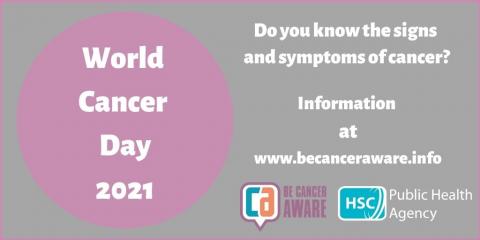Speak to your GP if you are worried about cancer symptoms, urges PHA

The Public Health Agency (PHA) is today, on World Cancer Day, highlighting the signs and symptoms of cancer and encouraging people to seek medical advice from their GP if they have concerns.
“The earlier cancer is diagnosed, the greater the chances of survival as treatment is more likely to be successful,” said Dr Louise Herron, Consultant in Service Development and Screening at the PHA.
“During the COVID-19 pandemic many people may have concerns about a change they have noticed in their body, but might be hesitant to contact their GP.
“However, it is important not to delay if you develop a sign or symptom which has the potential to be cancer, so we are urging people to seek medical advice if they have any concerns. It is important for everyone to be aware of warning signs which need to be investigated to ensure diagnosis and treatment.”
Some examples of symptoms are:
- coughing up blood or blood-stained phlegm (sputum);
- a persistent cough (more than three weeks);
- a mole which begins to change, such as getting larger or inflamed, or developing irregular edges;
- blood in a bowel motion;
- starting to bleed again after the menopause;
- mouth ulcers that have not healed after three weeks;
- food regularly seeming to stick on the way down when you swallow.
If you experience any of these symptoms, please talk to your GP.
- There are many things that people can do to reduce the risk of cancer, such as:
- If you smoke, stop, visit www.stopsmokingni.info for tips on helping you to quit;
- Keep alcohol consumption within safe limits www.drugsandalcoholni.info has more information on this;
- Take regular exercise and aim to keep your weight within the recommended BMI range www.choosetolivebetter.com has more information on simple steps that can help reduce weight;
- Avoid over-exposure to ultraviolet radiation from either sunbeds or the sun – use sunscreen, seek shade, wear sun glasses and a hat. Check your skin regularly for any changes. See www.careinthesun.org for more information.
The PHA has a website at www.becancerawareni.info which provides information about cancer signs and symptoms, explains what to do if you’re concerned, and signposts to recommended sources of support or further information.
Aside from being aware of symptoms, it is also important to make use of the range of cancer screening programmes that are available, and to attend for screening when invited.
“I would also encourage everyone to go for screening when it’s offered to them,” said Dr Herron.
“We have three excellent cancer screening programmes in place to help detect the first signs of cancer. These are for cervical, breast and bowel cancer, and each plays an important part of our efforts to catch cancer early.”
For more information on Northern Ireland screening programmes visit www.cancerscreening.hscni.net
